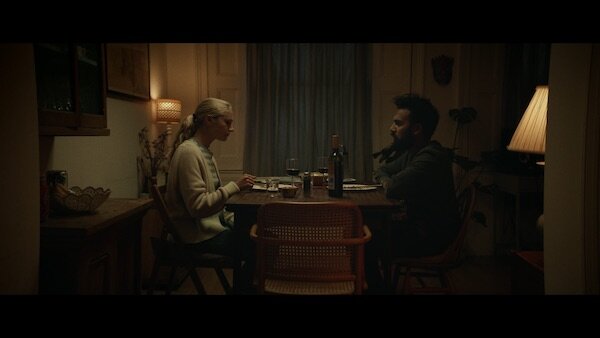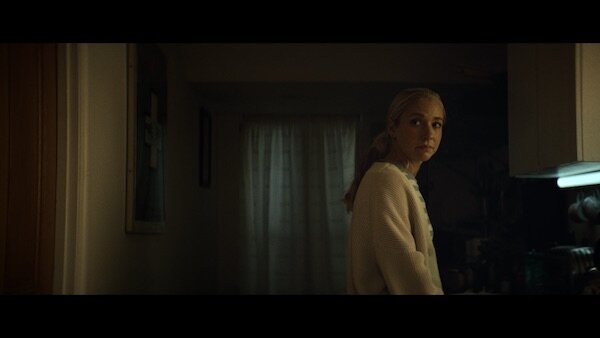Learning To Show Vulnerability: Saul Abraham On His Short "Enjoy"
Director Saul Abraham is a half Finnish, half British director and producer who works across drama, documentary and commercials. His last film, Breaking (co-directed with Josh feder) screened at London Short Film Festival and received a Special Jury Mention at Promofest, and his documentary, Moses: Strongman, was one of the most watched pieces from Idris Elba's BBC iPlayer takeover, leading him to be included in the BBC New Talent Hotlist. His last film, Enjoy (written by Callum Cameron), is an offbeat exploration of masculinity, men’s mental health, and how societal stereotypes surrounding depression in men manifest themselves across different generations.
Progressive muscle relaxation, Lycra, spoken word. As Michael (Himesh Patel) seeks novel ways to halt his spiraling depression, a moment of hope arrives via an unexpected source. Starring Himesh Patel (Yesterday, Tenet) and Maddy Hill (Eastenders, Casualty)
This powerful film recently had its world premiere at this year’s Tribeca Film Festival, and also screened at the recent Palm Springs International ShortFest. We had the pleasure of chatting with Saul about his film, its origins, approaching mental health, working with Himesh Patel, and much much more!
How did you get connected with writer Callum Cameron, and what was it like reading his script for the first time?
Callum and I have been friends since university, but we had never actually worked together before. He has been writing in the theatre in the UK, whilst I’ve been mainly making commercials and short films. A couple of years ago he sent me the script for Enjoy, and I loved it. I was struck by how delicately he handled feelings of misery, guilt, shame and worry whilst still making something warm, hopeful and funny. I didn’t know whether to laugh or cry at times and felt connected to Michael, as well as seeing a younger version of myself in Archie. Luckily, he agreed to let me make it with him!
The film crackles with a quiet profundity, and I found its final moments extremely touching. Stevie Smith’s poem “Not Waving But Drowning” adds so much to the film’s ending. Was that a part of Callum’s script initially, or was that something you discovered through the filmmaking process?
Callum is incredible at blending comedy and drama in his writing so the script was a perfect foundation to build out from. It was important to me that all the other choices in production and post-production always were in service to the story. The focus is on the characters and their story and not on anything fancy or distracting in the filmmaking. I wanted the use of music to be sparse. Leaning into the silences in the film allowed the music to mean more when it came in.
Mental health has been a growing concern, especially with the isolation that the pandemic inflicted on all of us. There have been many films, both short form and feature length, that explore this topic, but Enjoy brings a unique slant to the topic. Can you talk about your approach to the story and how you found a novel way to examine this subject?
Thank you, I’m glad you feel that way! It's an overused phrase and sounds pretentious but the film was just very honest and truthful to our own experiences and feelings.
We wanted to approach men’s mental health in a way I feel we rarely see depicted on screen. Although in different life stages, Michael and Archie are both suffering with neither having the language to express it. As Michael retreats into himself, Archie acts out — both reactions to not understanding their sadness.
On the surface they both have solid support networks — Michael has a loving girlfriend in Katie; Archie, a doting mother in Laura. However they feel they don’t have the right to be sad when everything around them is okay, which prevents them from talking even more.
We felt that often in cinema, stories centered around masculinity focus on something physical or ‘macho’ as a vehicle to show a character’s crisis underneath. In Enjoy, neither character is overtly masculine or needs to assert their authority in the classic patriarchal sense, yet they still can’t show vulnerability. This film aimed to shed light on what is entrenched in men as a whole.
I really loved the blue color palette that emphasizes the character’s internal state and reinforces the film’s themes. How did you find these beautiful locations that were filled with these lovely blue hues?
Ah nice, I’m glad you picked up on that! Tasha Back (DOP) and Eve Shillingford (Production Designer) did such a great job in helping me with that.
We spent a long time finding the right house location for Archie. It was difficult to find the right balance — it needed to feel like a comfortable family home that had been neglected somehow.
Parliament Hill Lido was always our first choice. Luckily, they let us film there. It rained all day and it was a really challenging day for everyone but perfect for the film.
Himesh Patel is excellent in the film. What was it like working with him, and did he happen to share any stories from his time working with Danny Boyle and Christopher Nolan?
We love working with Himesh. The role was written for him and we were so happy when he responded to the script and wanted to be involved. He so beautifully balances the comedy and drama and created a believable and real character with actually very few lines which in a short film is so hard to do.
I’m afraid I’m not your guy for Boyle/Nolan anecdotes. The fact that Himesh had just worked with those guys before and then had to spend three days with me mumbling at him was intimidating enough. So best not to think about it.
Do you have a favorite scene or moment in the film?
I think the scenes with Archie & Michael. Tom Sweet is such an incredible young actor, and we were so lucky to find him. Huge thanks to Heather Basten our casting director on that!
What drew you to the visual arts? How did you get into directing?
I started making films when I was kid and to be honest a very geeky hobby has (very) slowly turned into a job.
What films or filmmakers have inspired you, your style, or your approach to telling a story?
Hmm. There are so many that I’d take up too much of your time if I went through them all. I guess one that stands out that I mention a lot is Aki Kaurismäki. I’m half Finnish and my mum showed me a lot of his films whilst I was growing up. I’ve always been drawn to the minimalist ways in which he found humor in despair whilst never at the expense of the audience finding a deep emotional connection to his characters. Similarly, my aim when bringing Enjoy to screen was to have the audience laughing but equally heartbroken at the same time, all the while telling a story with nuance and treating the difficult subject matter with respect.
What do you hope audiences take away from the film?
Big question! Since Tribeca we’ve had a lot of messages from people saying they laughed loads and then cried loads. And that they felt it was a refreshing and honest take on men's mental health. Those are probably the biggest compliments we could get. So although I’m shamelessly tooting our own horn by saying them here I’d say if people feel like that when finishing watching the film I’ll be happy!
Do you have any future projects in the works that you can share with us?
A few things in the works but at the moment we’re just trying to enjoy this little run at festivals. I’ve definitely been on the other side before when you’ve poured everything into a project and it doesn’t get an audience so the fact that people outside of our little bubble are seeing the film is amazing.
What do you think? We want to know. Share your thoughts and feelings in the comments section below, and as always, remember to viddy well!



